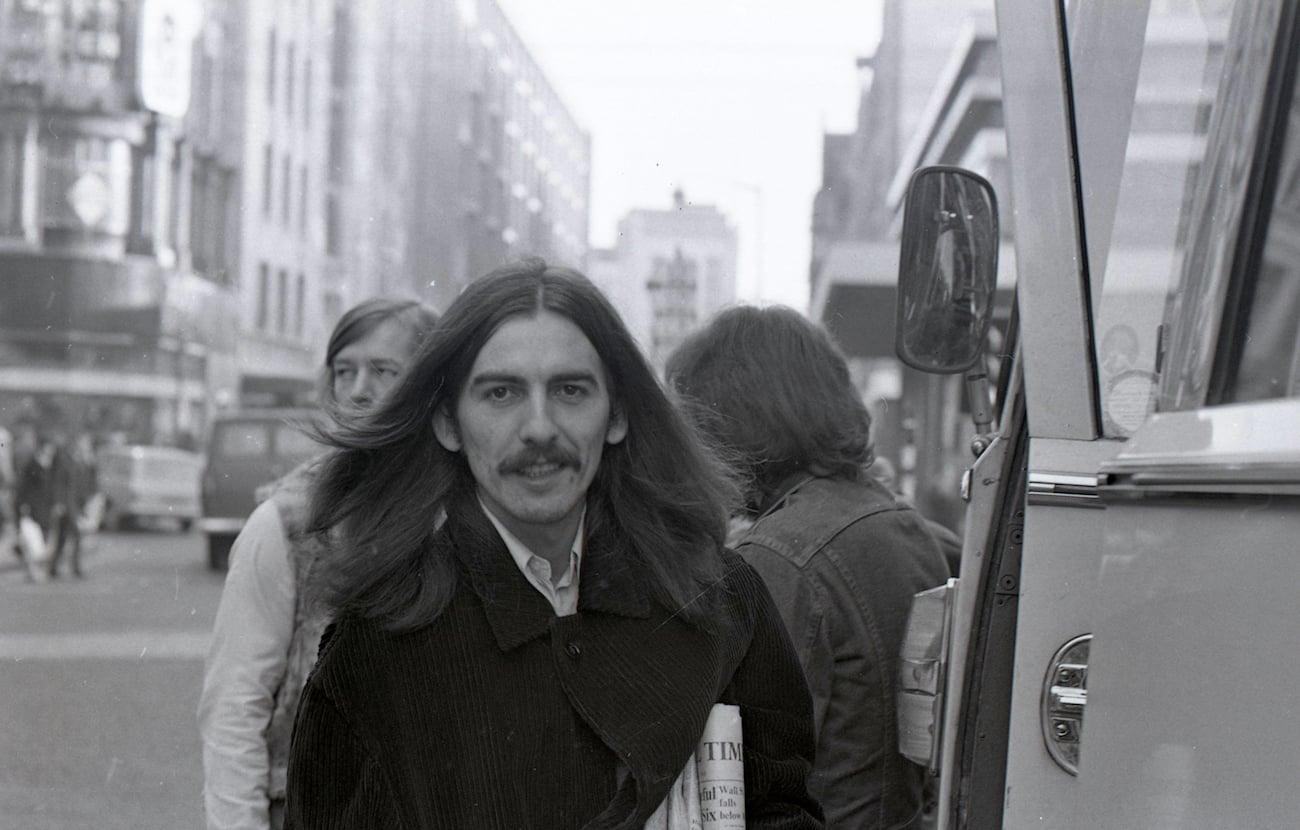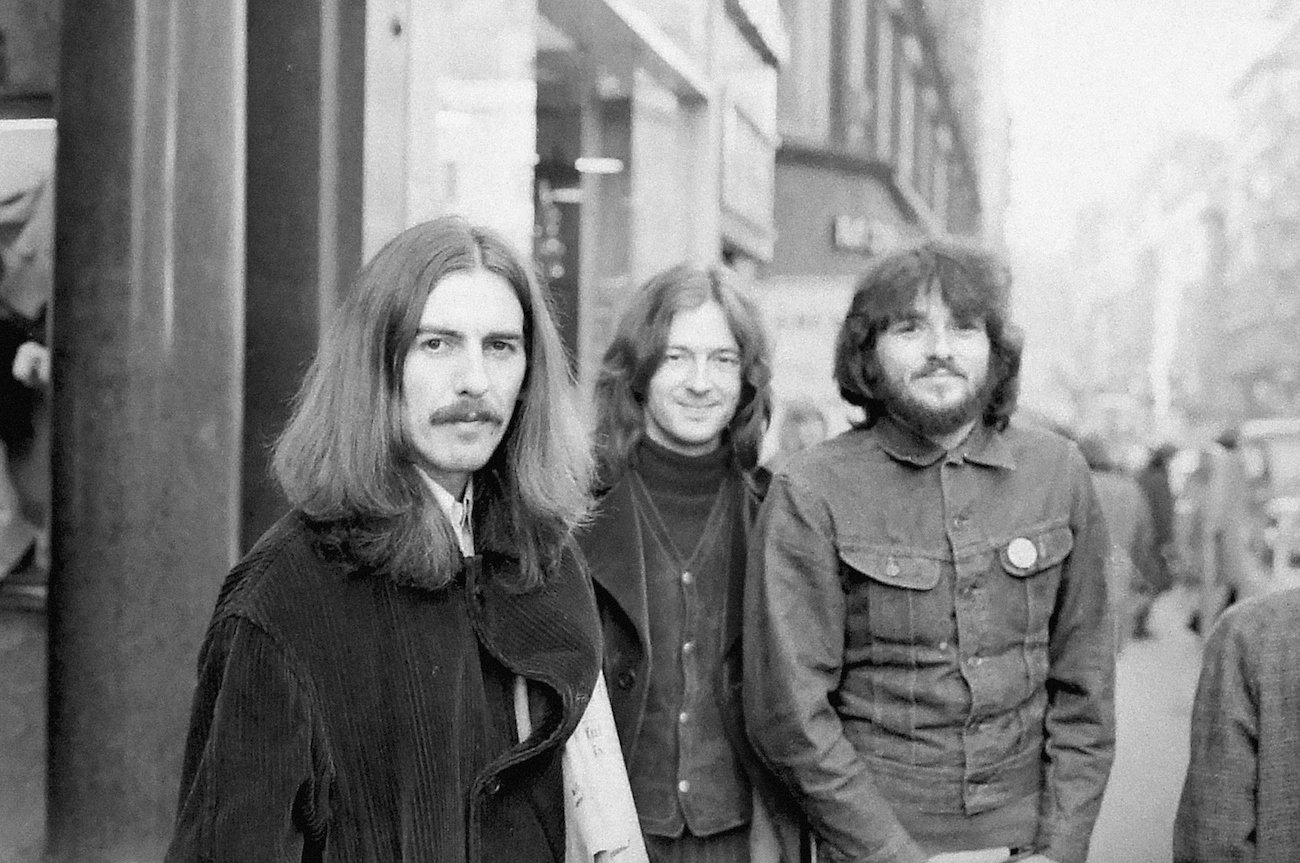
George Harrison Once Misled a Man Who Recognized Him on the Street: ‘We’re Not These Bodies’
George Harrison once misled a man who recognized him on the streets. The former Beatle preferred not to be recognized, but he couldn’t exactly help it. George liked being left alone after years of being watched by the media and fans. He felt uncomfortable with adulation. However, eventually, fans left George alone and treated him respectfully.

The Beatle hated adulation
During Beatlemania, George and the rest of The Beatles experienced some of the most nerve-wracking things. They were mobbed by fans and the press everywhere they went. The group locked themselves in their hotel rooms to keep safe on world tours.
George once said the whole thing aged him and made him a nervous wreck. He often thought he or the band would be killed somehow following President John F. Kennedy’s assassination. Thankfully, The Beatles stopped touring, and the group cooperated in the recording studio.
However, fans and the press didn’t avert their watchful gaze. None of the group could go out without being followed by someone, but at least it wasn’t like it was in the Beatlemania days.
By then, George had begun his spiritual journey and had become disenchanted with fame. He realized being God-conscious was more important than anything else and hated adulation. Instead of fans worshipping him, he felt they should worship God.
So, it’s understandable that George would’ve misled a fan who recognized him on the streets.
George Harrison misled a man who recognized him on the streets
In Here Comes The Sun: The Spiritual And Musical Journey Of George Harrison, Joshua M. Greene wrote about a time when George misled a fan who recognized him on the streets of New York City.
He and rock journalist Al Aronowitz walked down Fifth Avenue after flying into New York for the Concert for Bangladesh. While they finished their lunch at a sidewalk cafe, a man with a mustache spotted George and gave him a “quizzical” look.
Greene wrote, “He walked over and asked, ‘Are you George Harrison?’ ‘No,’ George said, deadpan. The man skulked away, convinced he had been misled.
“George turned to Aronowitz and laughed. ‘We’ve got to explain to them that we’re not these bodies.'”
George meant a couple of things in his statement to his friend. He once said he wasn’t Beatle George. According to Rolling Stone, he said, “The Beatles exist apart from myself. I am not really Beatle George. Beatle George is like a suit or shirt that I once wore on occasion, and until the end of my life people may see that shirt and mistake it for me. I play a little guitar, write a few tunes, make a few movies, but none of that’s really me. The real me is something else.”
George also meant that his body in the material world wasn’t his real body. He was a firm believer that dying was like taking your suit off. We all have different suits for different planes of existence, but he wanted so much to go to the spiritual realm. That was where he could be with God.
George came to terms with being recognized by fans
Unfortunately, George continued to be recognized by fans.
In 1975, George told David Herman at WNEW-FM (per George Harrison on George Harrison: Interviews and Encounters) that stardom made him want to be anonymous and invisible.
“Sometimes it’s just hard,” George said. “You’d just like to be anonymous. Sometimes I’d just like to be invisible, even now after 10 or whatever, twelve years, of that. I still find I can’t even go out.
“If I want to go out and watch somebody singing at the Roxy or something, I go in there and it’s like the club tilts over. I become part of the show. And that’s amazing after all that time. Sometimes it’s nice to be invisible and just go out and just be nobody.”
However, in the 1980s, he came to terms with it all. In a 1987 interview with Creem Magazine, George explained that he became comfortable with being a Beatle after settling down and recuperating. He found that the public had grown up with him.
“As things have settled down I’ve come to terms with it and it’s sunk into the past. We’ve gotten older and new generations have come along,” George said.
“I spent years avoiding interviews and going on TV to get to a point where I could go out, walk down the street and go in a shop and just do regular little things that ordinary people do. Everything’s cool and it’s quite enjoyable.
“And now, if somebody comes up and says, ‘Alright, George,’ and they just congratulate you and thank you for all the music you did in the past and what you’ve been doing–that’s nice. It’s the concentrated mania that would make anybody go crazy.”
George’s life was more peaceful once he came to terms with being a Beatle, and fans settled down and excepted that he wasn’t the Messiah.


